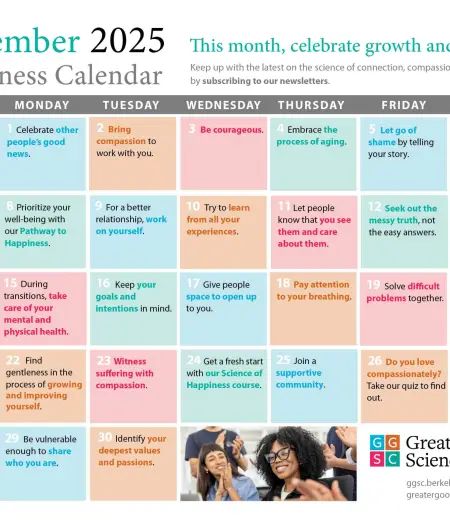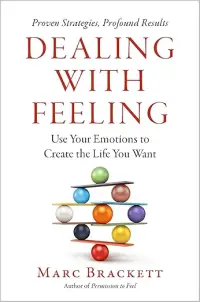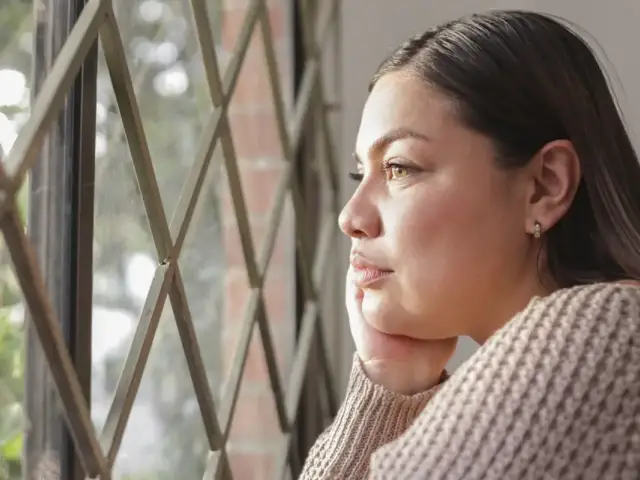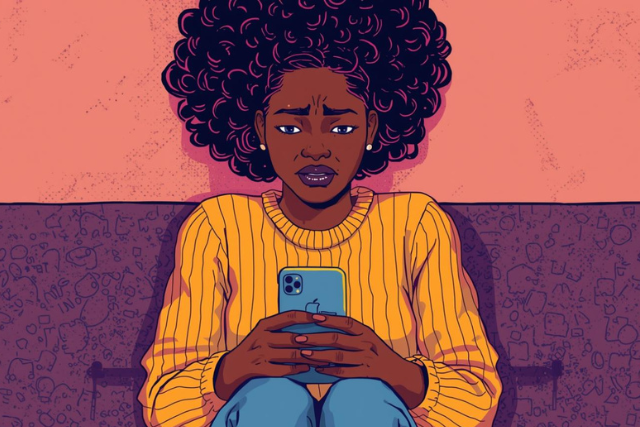What is your relationship with your emotions on a daily basis?
Some of us might deny that we’re influenced by our feelings at all. Others might try to leave our emotions behind when we move into certain environments, like work or school. We may believe that particular emotions are “bad” or “negative”—and so aim to avoid them as much as possible.
But according to Marc Brackett, founding director of the Yale Center for Emotional intelligence and author of the new book Dealing with Feeling, emotions are around whether we like them to be or not—and our skill in dealing with them will influence how much success and well-being we can attain.
X

His book explains how we can work with our emotions so they don’t get in the way of us achieving our goals or living the life we want. Emotion regulation is a skill that we should start learning in childhood, he argues— but many of us must revisit it as adults because no one really showed or taught us how.
Here is an edited version of my conversation with Brackett, where he explains in detail what this skill can look like in our daily lives and what to do in the moment when a difficult emotion arises. This is the first part of a longer conversation—you can read the second part about how an ideal society would teach this skill to kids.
Kira M. Newman: What is emotion regulation?

Marc Brackett, Ph.D.
Marc Brackett: Emotion regulation in its simplest form are the strategies that we use to manage our feelings to achieve good relationships, well-being, and goals. It includes thoughts and actions; we can shift our emotions by changing the way we think and by doing things.
I have an acronym PRIME: We can Prevent unwanted emotions, Reduce difficult ones, Initiate ones that we want to feel, Maintain the ones that we want to keep, and Enhance other ones. Essentially, emotion regulation is a set of goals and strategies that are a function of whatever feeling we’re having, who we are as a person, and the situation that we’re in.
That combination is helpful because you can start mapping it out: For example, I’m exhausted, I’m an introvert, and I’m being asked to go to a party. How do you say no, or make choices for yourself? Knowing that I’m an introvert—who, when he’s tired, likes to rejuvenate, not expend more energy—I’ll make the choice to go home or go to a yoga class or take a walk or go out for dinner with a friend, as opposed to go to a club, go to a sports bar, or hang out with lots of people. The more we know who we are in terms of our personality, the better able we’ll be to choose strategies that can work for us to help us manage emotions better.
The other piece is culture. Some cultures have different methods, and there’s no wrong or right. There’s one criterion that you have to look for, which is am I hurting myself, or am I hurting other people? Other than that, the world is your limit in terms of regulation.
KMN: What does an emotionally regulated person look like? How do we know when we’re sufficiently regulating our emotions?
MB: They look like any person except that they’re in a place where they are not thrown by their emotions.
Let’s start with what they’re not. They’re not yelling, screaming, saying unkind things, being mean and hurtful. They’re also not self-denigrating or ruminating extensively or denying or ignoring or suppressing emotions, nor are they using substances to regulate.
What they’re doing is they’re using healthy strategies to manage their emotions. They’re noticing what their feelings are. They’re asking themselves questions about the helpfulness or not of those feelings. And then they are choosing helpful strategies.
KMN: What does emotion regulation feel like as a habit integrated into our daily lives? Do we stop and respond to every feeling that we have?
MB: A lot of our emotion regulation is automatic; it’s unconscious. We’re working on a project and we get a little overwhelmed, and we take a deep breath. We didn’t even think about that. Or we decide we need a break and we’re going to go for a walk.
Do all emotions need regulation? The answer is no. Otherwise, we’d go crazy. We don’t want to be attending to our emotions all day long; I think that would be unhelpful. What we want to do is notice if we’re having a strong emotion that is interfering with a goal.
Let’s say you’re at home and you get into a fight with your dog or your partner or your kid, and then you’re going into an important meeting at work. That’s a good opportunity to say, OK, I’m really angry at my son and I don’t want to sit with that anger in that meeting, so I’m going to take my breath, and I’m going to attribute my anger to what happened this morning and not allow it to have power over my conversation that’s coming up.
Those are the opportune moments for both emotion check-ins and emotion regulation—when you notice a shift or when you are going to be doing something important. I did this podcast with a lot of followers, and I wanted to be the best version of myself. So before I walked in the door, I took a breath and I’m like, How are you feeling, Marc? Are you nervous? Are you excited? Are you overwhelmed? And I was feeling tired and a little overwhelmed. And I said, Well, how do you want to show up? What emotion is going to best serve you for this interview? Well, I want to be inspiring, and I want to be connected to the interviewer. OK. So what’s your strategy for getting there? That to me is what emotion regulation is all about.
KMN: Certain feelings seem to be about what they’re about, and certain feelings seem to be echoes of past wounds or triggers. Is there a difference in how you deal with those types of feelings?

Dealing with Feeling: Use Your Emotions to Create the Life You Want (Celadon Books, 2025, 320 pages)
MB: I think what you’re getting at are feelings versus emotions. Our experience of any instance of emotion is always connected to our history. We have these accumulated instances of feeling a certain way about a certain person or getting angry, sad, fearful, surprised, and it’s like an accumulation of all of your life is coming up in that one little emotion.
That’s important because it means that it’s a learned experience, and then you can evaluate if your responses are helpful or unhelpful or adaptive or maladaptive to your well-being and then make a choice to say, OK, I need to step back and reappraise or learn a more helpful way of dealing with this emotion or feeling.
For example, I grew up with a father who had a lot of anger, and he was aggressive with his anger. His facial expression was strong; his behavior was, in my view, inappropriate. So I’m sensitive to anger. My relationship to anger might be different from someone else who grew up with a father who was very gentle. I have a different representation of anger in my brain. My representation for anger is like Run away because danger is happening, whereas someone else might not have that same reaction because they didn’t have that experience with someone who was angry.
KMN: If we don’t like how our emotions are affecting our lives, how do we simultaneously accept our emotions while also wanting to change ourselves?
MB: Emotions come, as we say, unbidden. The experience of a feeling, it just happens. That’s life. You watch a movie, you’re in a conversation, someone says something hurtful, mean—the feeling is the feeling. I think accepting that that’s reality is a good thing to do. My feelings are my feelings, and they happen and it’s OK.
Then you have to make a decision. And this is the big one, which is: Is how I’m feeling very strong and getting in the way? Am I feeling it for too long of a period of time and it’s interfering with my success or my well-being or my decisions? The opportunities for shifting are generally around intensity and duration.
It doesn’t mean you don’t accept it. Everybody gets permission to feel, as I say. There’s no option there.
For example, I’ve had anxiety for 55 years. I used to have a very weird mindset around it, which was I have to find the doctor who’s going to carve out the area of my brain that makes me anxious and then I’ll never have anxiety again. That’s not going to happen.
Then a friend of mine interviewed me about my anxiety, and she goes, “What are the things that you feel anxious about?” And I shared all these different things. And she said, “What do you notice that’s in common about the things that make you feel anxious?” I said, “Well, actually it’s interesting because it’s all the things that I care about.” And she said, “So why would anxiety be bad for you? What if you just reframed it as the anxiety you have around the uncertainty of the outcome is really because you care about it?” If you think about it through that lens, it doesn’t mean you just ignore it, but you now apply a strategy with that mindset. It has radically changed my life because I don’t think of it as a strategy to get rid of my anxiety; I see it as a strategy to work with my anxiety.
We have been taught and almost made to believe that all unpleasant emotions or “negative” emotions are bad for us or derail us from a goal, and I just think that’s misguided. We just haven’t been taught healthy strategies to deal with those emotions, and so we allow them to escalate—so peeved becomes irritated, irritated becomes angry, angry becomes enraged; down becomes disappointment, disappointment becomes hopelessness, hopelessness becomes despair, despair becomes depression. If we were more emotionally self-aware when we’re having little feelings, I think we would prevent a lot of the stronger, intense, unwanted emotions.
KMN: How much are people in control of what they feel?
MB: I think we are in much more control than we ever thought because our emotions are our responses to situations that happen in the world around us. Not everybody has the same reaction to the same stimulus. By way of example, if you’re on a roller coaster ride, one of us is sitting there thinking, “I’m going to die.” The next one is like, “This is so freaking boring.” It’s the same roller coaster, but the difference is our appraisal of what the roller coaster means—if I’ve been on much bigger roller coasters in my life or if I got hurt on a roller coaster when I was a kid. All these are associations that are happening, that are learned over the course of our development.
My hope is that people will just be aware of that. Just be aware that somehow across your development, you learned how to respond to emotions, you were taught somehow or another, whether implicitly or explicitly, that you should not talk about it or deny it or suppress it or it’s OK to talk about it.
It’s important because it gives us a little bit more ownership over what we feel or how we feel and what we do with those feelings. Oftentimes, some people say, “You made me feel this way.” And, yes, people say things that can be mean and they can activate feelings in us. But we have to make the choice to say, Well, thank you for your gross behavior, I’m not owning that. I think the hard part is that we’re not taught how to do that.
KMN: So we can be creative with our emotion regulation strategies.
MB: I think it’s a creative process, actually. I play a game with myself. Sometimes when I’m feeling activated by somebody, I’ll remind myself, Marc, you’re the director of the Center for Emotional intelligence. You’re like the Yoda of Emotional intelligence. Be creative in your response to that.
And it’s fun, actually. I’ll say something completely outside of the box, like “That was a really fascinating comment. I’m curious where that came from.” And the person’s like, “What do you mean?” I’m like, “Well, I wasn’t expecting that from you. Say more about that.” I love that process. And I think that it is an exercise in creativity.













